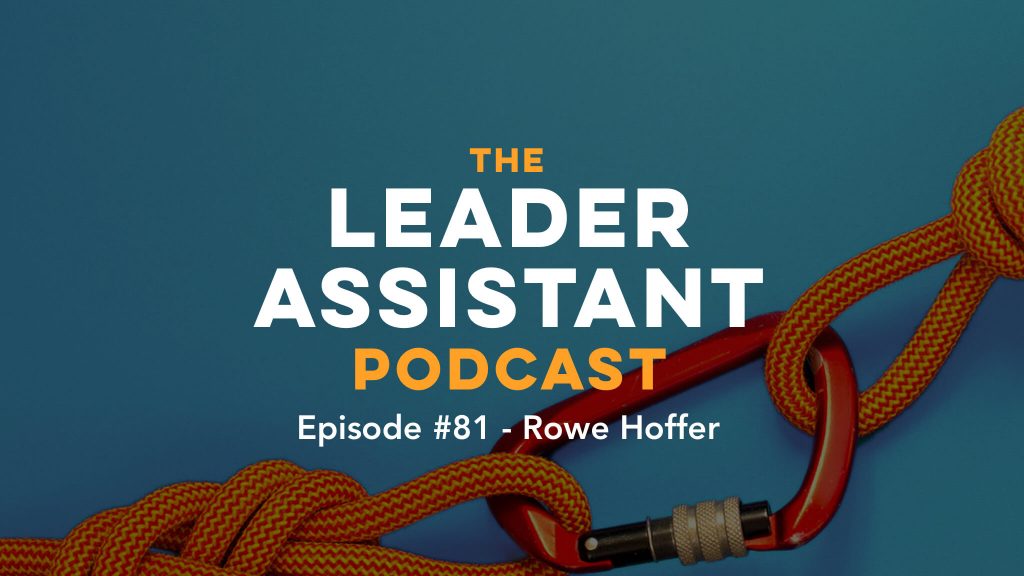Rowe Lapiña Hoffer is the Sr. Executive Assistant to Mozilla’s co-founder and Chairwoman, Mitchell Baker.
In this episode, Rowe talks about seeing our role as assistants as important and vital to our organizations, the importance of boundaries, and having the humility to help where needed versus having a sense of entitlement. We also talk about the title “assistant” and what it means to us.
NOTE: The following is an excerpt from my book includes a snippet from an essay I sent Rowe that she refers to in our conversation.
Serve the Work
Dorothy Sayers, an English crime writer and poet, wrote an essay called “Why Work?” I find her ideas in this essay fascinating to think about as they relate to how we can be confident in our role. In “Why Work?” Sayers says a worker must “serve the work.” This sounds like a recipe for burnout, but hear her out:
“The moment you think of serving other people, you begin to have a notion that other people owe you something for your pains; you begin to think that you have a claim on the community. You will begin to bargain for reward, to angle for applause, and to harbor a grievance if you are not appreciated. But if your mind is set upon serving the work, then you know you have nothing to look for; the only reward the work can give you is the satisfaction of beholding its perfection. The work takes all and gives nothing but itself; and to serve the work is a labor of pure love.… It is the work that serves the community; the business of the worker is to serve the work.”
SPONSOR FOR THIS EPISODE
Check out LifeSquire.com – an Assistant Resource Center focused on matching executives with assistants, and creating relationships – where both sides thrive. They would love to help you find the perfect job or work with you to enhance your skillset.
LEADER ASSISTANT MEMBERSHIP
Check out the Leader Assistant Membership for ongoing training, coaching, and community.
LEADERSHIP QUOTE
Leadership is not always found in the loudest voice, in front of the biggest and most receptive crowd. A leader, whose intent is pure and authentic, can move a crowd and a single person with a whisper.
– RLH
CONNECT WITH ROWE
ABOUT ROWE
Rowe Lapiña Hoffer is the Sr. Executive Assistant to Mozilla’s co-founder and Chairwoman, Mitchell Baker.
The Mozilla Foundation focuses on fueling the movement for a healthy and open internet. The Foundation is also the sole shareholder in the Mozilla Corporation, the maker of Firefox and other open source tools.
Rowe is responsible for keeping the Office of the Chair organized and moving forward with efficiency. In addition to her role in the Office of the Chair, Rowe is an integral leader in the sourcing, recruiting, hiring, and on-boarding of Administrative and Executive Assistants across the organization. She also serves as a Culture Ambassador for Mozilla, fostering a positive work environment that attracts and retains top talent.
Before landing on the tech runway, Rowe worked in the fashion industry, where she cultivated her interests in arts, theatre, design, and style.
Prior to joining Mozilla in 2011, Rowe honed her business acumen and strong communications skills at The Computer History Museum, NetApp, Hyperion Solutions, Arbor Software, SeeCommerce, and Decision Focus Inc.
Today, outside of Mozilla, Rowe is also an entrepreneur. She and her husband founded and run MichRoFit, a fitness company specializing in functional training and athletic coaching. In 2017, Rowe created Vitamin D(ance)® and she continues to teach her all-original choreographed routines to people of all ages who share her passion.
Rowe has identical twin girls in middle school who Rowe describes as “extremely funny in a sarcastic, dark-humored way.”
THE LEADER ASSISTANT BOOK
Download the first 3 chapters of The Leader Assistant: Four Pillars of Game-Changing Assistant for FREE here or buy on Amazon here.
JOIN THE COMMUNITY
Join the Leader Assistant Slack Community here, or the Facebook Group here for bonus content and to network with other assistants who are committed to becoming leaders!
SUBSCRIBE
Subscribe to The Leader Assistant Podcast so you don’t miss new episodes!
You can find the show on Apple Podcasts, Spotify, Google Podcasts, Pandora, and Stitcher.
Join my email list here if you want to get an email when a new episode goes live.
LEAVE A REVIEW
If you’re enjoying the podcast, please take 2 minutes to rate and review the show on Apple Podcasts here. Each review helps me stay motivated to keep the show going!
—
EPISODE TRANSCRIPT
Rowe Hoffer 0:00
Hi. I’m Rowe Hoffer. With today’s leadership quote, leadership is not always found in the loudest voice in front of the biggest and most receptive crowd. A leader whose intent is pure and authentic, can move a crowd and a single person with a whisper.
Podcast Intro 0:24
The Leader Assistant Podcast exists to encourage and challenge assistants to become confident, Game Changing leader assistant.
Jeremy Burrows 0:35
Thank you for listening to The Leader Assistant Podcast. Hey friends. Before we jump into today’s interview, I wanted to share a brief note about this episode’s sponsor, which is life squire. Life squire is an assistant resource center focused on matching executives with assistants and creating relationships where both sides thrive. They would love to help you find the perfect job or work with you to enhance your skill set. You can check them out at lifesquire.com/leader assistant. That’s lifesquire.com/leaderAssistant. Alright, let’s jump into today’s interview, you can check out the show notes at leaderassistant.com/81 Hey, everyone, thanks for tuning in to The Leader Assistant Podcast. It’s your host Jeremy Burrows and today I’m speaking with Rowe Hoffer. She’s a senior executive assistant to Mozilla’s co founder and Chairwoman. Rowe, How’s it going?
Rowe Hoffer 1:34
It’s going really well. How are you Jeremy?
Jeremy Burrows 1:37
Good. Good. Just excited to chat with you. What part of the world are you in?
Rowe Hoffer 1:42
I am speaking to you from Mountain View California. In the Bay Area.
Jeremy Burrows 1:48
Awesome. So let’s kind of jump right in. And why don’t you tell us a little bit about your your backstory? What was one of your first jobs? And what did you learn in that role that you still use today?
Rowe Hoffer 2:02
Ah, gosh, this will take us far, far back. So my first job was the title was Guest Relations Officer. And this was for the Manila Film Festival. I used to live in Manila, Philippines. And I was doing that job when I was 18 years old. So pretty young. And what I learned from that is definitely how to have my voice and advocate for myself, it was a pretty wild ride. You know, you’re dealing with actors, actresses, directors, producers, all in the bid is very international. And being so young, I didn’t have my land legs firmly planted. But it was a fantastic opportunity, obviously, for the excitement of it. But as well, there were instances where I really was way over my head. And so what I learned from there is fortitude. And really, really having a voice not being afraid to push back when necessary. As well I learned how to think on my feet, and also have a presence that commanded respect, and at least not be dismissed so easily.
Jeremy Burrows 3:28
It’s great. So you said there were some a lot of interesting experiences, what what was maybe one of your biggest mistakes that you made in that role.
Rowe Hoffer 3:41
One of the biggest mistakes was just not thinking that my role being such a smaller scale compared to what the other people’s roles, or that mine would be insignificant. So the lack of belief that just because I was in the background, just because I was young, that it didn’t matter. What felt to me was not the way to do things or how to go about things.
Jeremy Burrows 4:17
So what do you love? Or actually take a step back? When When did you kind of really own and go into that EA role where you thought okay, this is this is my career.
Rowe Hoffer 4:29
In 1994, that’s the first EA job I had. And I have this hashtag on LinkedIn called an accidental assistant because that’s pretty much what I am and I think most of us are accidental assistants. I don’t think we all woke up one day and said in the future, I’m going to study to be an executive assistant. And like now, I don’t think we had those college courses to go into this career that we love. But in 1994, I was working as an office assistant, I had come from a background of fashion and theater. And moving to the States to the Bay Area, specifically, the demographic obviously, was not that for theater and fashion, that was not exactly the most obvious job that you’ll find. So I took this job as an office assistant, and did that for a couple of years. And the chief operations officer, when she needed an assistant, turned to me and saw the potential. And that’s how it all started. And it was really a soft landing, because she had known me for a few years, and she became this fantastic mentor, who just to this day, all the things that I learned from her still apply, even though that was when 9094 till 1996 was when I worked with her.
Jeremy Burrows 6:03
So what do you what’s kind of your favorite part about the role of an assistant even today?
Rowe Hoffer 6:11
From then to today, I would say, it’s just never always the same. It’s not a cookie cutter job. And it’s a combination of so many things. And there are so many reasons, I love it. So I feel it’s an art form. I feel that there’s art combined with a lot of science behind it. So it’s like, how do you say it? It’s like being a shapeshifter. And whatever shape you currently are in, you have to be it completely. So when I think about when people say, assistants wear so many different hats. I’ll take that even further. I think we are the the hat, the shoes, the top, the bottom, the jacket, the accessories. So for that reason, I love the variety and how vast the reach the potential. And yeah, you know, even the risk and the challenges. They’re never the same for any set of things. One day is just completely different from the next.
Jeremy Burrows 7:19
Yeah, I’m pretty much the same. I love the variety. I love that there’s never a dull moment. I don’t know that I could do a cookie cutter gig at this point,
Rowe Hoffer 7:34
right? And so do you agree that it’s so it’s such an art form, because whatever it is that you’re doing for that moment, you’re so immersed in it. But it could be just a minute, and you’ve just completely changed gears and you’ve shifted, and now you’re fully immersed in that one. And the transition is almost needing to be flawless. You just have to master the art of juggling balls and spinning plates.
Jeremy Burrows 8:00
Yeah, I totally agree. I like to call it managing the tension, this kind of idea that there’s always you’re always being pulled one way or the other. And sometimes it’s the same time. Sometimes it’s within a couple of minutes. Sometimes it’s from the exact same executive that just pulled you the other way, a few minutes prior. So you kind of have to manage and embrace the tension as an AE. So yeah, totally agree.
Rowe Hoffer 8:27
Correct. Correct. And when you said the tension, but the beauty of the tension is it creates energy. So when there’s tension, it could be good energy. And yes, it could be bad. But the part about EAS is any bad energy. It’s our job, and it’s in our DNA to shift that into positive. That’s another reason why we love it.
Jeremy Burrows 8:52
So what one productivity hack that you can’t live without something that really helps you get stuff done.
Rowe Hoffer 9:02
You’ll find this very basic. But the one thing I cannot live without is my email inbox. I know that we fear inboxes that are unread. But I tend to read every single message but the ones that I can’t fully digest or wrap my head around. I leave them in bold. So either I flag it, there are so many different ways to catch your attention. But for me, the simplest way is to leave them unread, even though I’ve read it. So that’s my hack, because then it’s just glaring at me. Every time I go back to my inbox, it’s there. And since I don’t like that it’s bold. Then it forces me it makes me just go back to it. And sometimes it takes me three attempts. But that’s my hack for myself.
Jeremy Burrows 9:58
No, I actually do the same thing. I Everything’s and then if I need to address it later, and I can’t handle it right that that second, I’ll mark it as unread. And then yeah, that’s kind of my to do list. So
Rowe Hoffer 10:11
I miss there were some features back then when there were alarms or it would pop right back in. And I don’t know if that’s just something that went away for our email or you know, see that’s the thing. Well,
Jeremy Burrows 10:28
I’m actually are you so you’re on Google then. So no, no, you’re not. You’re on Mozilla. Yes. Yes. Because there’s different. There’s like a snooze feature that I use and Gmail. That brings it back up to my inbox, which I love.
Rowe Hoffer 10:45
Oh, wait, I do have that where you can actually customize the time that it’s going to come back at you. Yes, yes, I do. I do have that as well. Yeah. Sorry. Go ahead. No,
Jeremy Burrows 10:56
I just said if I find it helpful,
Rowe Hoffer 10:59
it doesn’t come back as bold, though.
Jeremy Burrows 11:02
There are Yeah. You know, there used to be a plug in that I use that did that where it did come back as a bold so yeah, I don’t know. I’m sure there’s a plug in somewhere for.
Rowe Hoffer 11:16
So there’s a call out to our fellow assistants. If anyone can tell us how to do the snooze button. Have it come back as bold? We’ll welcome that.
Jeremy Burrows 11:24
What’s the what’s the email provider again that you guys use?
Rowe Hoffer 11:28
What can we do use Google actually do? Okay. Yes.
Jeremy Burrows 11:32
But it’s through Thunderbird like, do you use Thunderbird or
Rowe Hoffer 11:35
we have Thunderbird? Yep,
Jeremy Burrows 11:37
we do have it. Okay. Cool. Okay, so if an assistant called you tomorrow, and said, Ro, I am just not respected in my role. What do I do? What would you say to them?
Rowe Hoffer 11:51
There’s a lot of layers to peel there. I would tend to ask, first off, what is the relationship like between you and your executive? And how do you together appear to the rest of the company or to the rest of your executive team or EA team? I always believe in the fact that how you’re treated by your manager is what will transfer over? So that’s my first question to an EA who feels not respected. Now, if it’s your executive who’s showing a lack of respect for you, then we have to dig a little deeper than that. Is it you individually? Or is it the role you play? Is it just not a valued position in the company. So there’s a lot there that we need to unpack, right? But my advice would always be, first off, be consistent in the good work you provide. Because eventually, that’s the bar that you’re setting, just even for yourself, but for other EAS as well. So you collect you gather respect from the places that are ready to give you that and are available to you. And hopefully that carries over. Because sometimes there are people who are just not tuned in. And we’ve all run into people who don’t even know the value of an assistant. Not that they mean to disrespect, but just the fact that they don’t see the weight of the value and impact that an EAA gives. So to me, it’s get respect from other sources, and hopefully it spreads like wildfire.
Jeremy Burrows 13:36
That’s good. Let’s talk a little bit about boundaries. How specifically with our executives, or maybe other executives that we work with? How can we know when boundaries are crossed?
Rowe Hoffer 13:54
When boundaries are crossed? So can I paraphrase the question, and instead I say, How can we not know? Yeah, there you go. So how can we not know? We see as one of our superpowers is the fact that we have this strong spidey sense. I heard that late into my career, and I thought what is spidey sense, but basically, that’s the ability to know things without something tangible, right? It’s that gut feeling. And we all know that gut feeling has basis. It’s real. It’s that one that sends off alarms and bells and whether they’re soft, like gentle chimes or whether they’re fire alarms, we all have it. So speaking to our roles as EAS Morse, more specifically, how can we not know when a boundary is crossed? We feel it. And the thing about that feeling is what do we do about it? So I’ll jump ahead, how can we not let someone cross a boundary? I’d say, first off, our tasks are so unpredictable, that it’s easy to not realize when one one’s boundaries crossed. So listen to that gut feel. And I also find that our foundation is EAS, we have those small tasks, and to me they’re not menial, and they’re not, grunt work. They’re all part of the package. They’re all part of that shape shifting that I mentioned earlier. So I personally, Jeremy, I don’t find that my boundaries are crossed often, because I think I give myself and other people such a wide berth. And it’s not the task that’s making me think that my boundary is crossed, but rather, the how and the why it was asked of me. Does that make sense? Yeah. So I know when someone asks me for something, because it’s necessary for the advancement of a project or a goal or our mission. Now how it’s asked of me, that’s where I sometimes draw the line, or where I have my alarm bell going off?
Jeremy Burrows 16:32
Yeah, that makes sense. So that’s kind of a good segue to the next question. So a lot of assistants kind of noticing a trend towards a little bit of entitlement among assistants. And it kind of relates to the boundaries discussion, because they’re like, Well, I’m trying to set boundaries, and I don’t, you know, I don’t do that, I’m putting my foot down. Because, you know, maybe I’m, I’m too, I’m too valuable, or I’m too important to go get my executives coffee, or pick up the dry cleaning. So now, I while I’m certainly a firm believer in the fact that our role is not just to make copies or pickup coffee, I also believe that true leader assistants, and true leaders really are never above, quote unquote, above things, like taking out the trash or picking up coffee. So what have you seen in the community? And how would you encourage assistants to embrace all types of tasks? And really kind of resist that entitlement desire?
Rowe Hoffer 17:40
Yeah, that’s a tough one. So what I’ve seen happen, in my opinion, is a result of a very positive step towards the right direction. And that is that EAS are viewed as a thought partners critical to the success of the team of our our execs as well. So we’ve come a long way from being that pool of secretaries like in that movie 95. Yeah, remember? So because of that shift, it also brought with it more responsibility, and yeah, and elevated category in the way we participate. So all good, that’s wonderful. We are more than that. How many words a minute Do you type kind of have a role. So the flip side to that, though, is I have seen assistants forget the word Assist is in our title. And that is not limited to only those elevated responsibilities that we now enjoy. And as I mentioned earlier, our successes as EAS, I feel they’re still built so much on the work we do the basic work that we do work that often are not even listed in a job description that we found or we answered or the performance review. So when you said true leaders are not afraid, or they don’t find it beneath them to roll up their sleeves and get the work done. If I see an executive who does that, then to me, that’s, that’s just the most basic of my job. And that was the foundation my career was built on. So I don’t ever feel like anything is beneath me. And as an assistant, that’s part of it all. That’s the beauty of it. That’s one of the dimensions that we talked about earlier. That’s part of not being cookie cutter. And if my getting coffee for my executive or a guest, or a fellow EAA means it gives them five more minutes to concentrate To unsay an email that they wanted to craft and send out in time, then why would that be a menial task to do? If my going out to pick up dry cleaning, means my executive can spend half an hour or more on a board deck, that’s success waiting to happen, or something unsuccessful waiting to happen. So that’s my feeling on that. So assistance and feel that we’ve become so important and elevated. You know, Jeremy, that tends to bite them back in the I have to say it comes around, because when you present yourself as such, you are limiting yourself, you are not exemplifying that wonderful aspect of what we are all about. And you don’t want to be remembered for, for not being helpful or for not assisting. So again, we can call ourselves executive business partner. But at the most basic, the word is still assistant.
Jeremy Burrows 21:15
Yeah, yeah. And I actually liked the word assistant. I know some people are like, Oh, I don’t I don’t like the the title assistant, I’d rather be called business partner, which I’m nothing against that title either. But I personally like, like the title, I like how it communicates that you’re helping someone and in the company and an executive, or team of executives, accomplish their goals. And that’s something that I’m passionate about. I love helping other people win.
Rowe Hoffer 21:48
Yes, correct. And I’m with you on that one. I do. Take pride in that word, assistant. And I know what you’re saying about Sure. We are business partners. So we are ambassadors. But the word assist to me gives me so much more. It’s more vast for me as far as here’s what I can do a lot. I’m not bagged into one round hole, I could expand, because the word Assist is to be helpful. So there’s the DNA in all of us. Correct. There’s that DNA assistant, that is in us, it’s that pride and love or being available to people in whatever capacity with the right boundaries.
Jeremy Burrows 22:41
Right? Of course. Awesome. So if you could snap your fingers and instantly give all assistance more of something, what would it be?
Rowe Hoffer 22:53
Time? No. Okay. We all say we never have enough time, I would give all assistance. Gosh, I give them all wonderful mentors, mentors that actually get the job we do. Because there’s a lack of mentorship, like true mentorship, that every single one of us needs forever, regardless of how elevated or how high or whatever category in your career level guide you’ve gotten to somebody, somebody that will just be able to push and pull you out of your comfort zone because it can get comfortable after a while.
Jeremy Burrows 23:43
Yeah. Yeah, that’s great. How do you work on developing new skills and growing existing existing skills in your role?
Rowe Hoffer 23:57
There’s a lot of that happening right now, while we’re all working remotely. So I am finding I have extra time because there were so many parts of my role that are not happening right now, which is travel. It’s not there arranging of travel, it’s not there. So there is just unbelievable amounts of reading to be done. And I am all of a sudden just so engaged with in LinkedIn. I know you are all of these articles that fellow assistants, right? And all these different researches that show up. So my go to right now is LinkedIn because at least I can curate the things that I like to read or that are pertinent for this particular time. And how to stay not complacent. I think I would, I would chalk that up to the fact that my boss will never let me be complacent. Because she lives in ambiguity. So I have to be very comfortable with that. And for me to not drown. I have to overextend myself, constantly, she puts me, she makes me feel like I have not been with her for nine years, half the time. So that’s good, because then I never feel like I’ve got all of this under a control, there’s a certain drive in me that still wants to learn and still wants to not feel like there’s nothing more for me to do.
Jeremy Burrows 25:46
So what, how has that been to work for the same executive for so long? And, you know, a pretty large organization, pretty well known Mozilla, how have you, what have been the kind of pros and what have been the cons of working with the same executive for that long.
Rowe Hoffer 26:08
So what I love about Mozilla is we are such a unicorn. And we’re needing to stay relevant because of the mission that we do. So the internet is ever evolving constantly. So that means we ask the people behind Mozilla, we need to stay on top of those, the shifts the switches, what is important and to not ever be stale? Because then what are we for? So the fact that I love about Mozilla is also that it’s ever evolving. And so nine years for me, Jeremy feels like, maybe three, because there’s something new that we’re developing, there’s something new, we’re fighting for it, there’s something new that my Chairwoman is joining or speaking about, or being asked about. And through osmosis, I feel like I am evolving along with her and with the company. The downside, the downside is really to me, probably perception of people. So people perceive that I maybe am just too comfortable. And I don’t want to extend myself out. Which is so completely opposite if you knew the work within, and the kinds of missions and goals we have that we aspire for. So other than the perception of people or looking like, wow, nine years. Why? Because we live in a day and age when people think nine years is well, you must be so bored or so uncomfortable with change, which is not the case.
Jeremy Burrows 27:58
Yeah, I was at my last organization for 12 years. And it was with my, the founder as his EA for about six years. So. But he, you know, I was there for another six before that before I was his direct EA, but still working for him. And yeah, it’s kind of it’s funny that nobody stays in a job that long anymore, you know,
Rowe Hoffer 28:22
right. Is that is that the call you would get from recruiters, that’s always the call I would get. It’s time for you to go. I heard that once. While you’ve been there five years, it’s time for you to leave.
Jeremy Burrows 28:35
Time for something new. Yeah, that’s it’s great that you get to work for an executive in an organization that is always adapting and changing and doing new things. And yeah, keeps it interesting. Yes. So what makes an assistant a leader?
Rowe Hoffer 28:53
What makes an assistant leader knowing your job really well, because first off, you have to be secure, that you know your job. You sent me a wonderful article that said, honor the work. Remember that and the work that you do, whether small or big, small project, big project, you need to honor that. And when you do, people will tend to follow, just like my quote about leadership. Think I wrote that because in my head, I was thinking, my voice is so small, but at the same time, some of the loudest voices don’t inspire me. So an assistant being a leader doesn’t have to constantly be on some stage or has a team of 45. It could be there are three of you. It could be their two, it could be your one. So what makes you be a leader? is showing up showing up as authentic and as inspiring as you could possibly be. Because once you’re not authentic, then it unravels, because you yourself will know, there’s something missing in the work, you’re not honoring the work anymore. So when you do that, when you honor the work, people feel it. Your vibe is different. When you don’t believe in your work, you make mistakes, you don’t care as much. And then on the other side of that, always be humble about the work you do as well. Because once you feel that, you have nothing else to learn, the minute you stop thinking that you have questions that need answers, I feel that that’s the death of your inspiration and of your drive. So to be a leader, you need to dig deep in yourself. Do you believe in the work you do? And do you honor it?
Jeremy Burrows 31:06
Could have put it better myself?
Rowe Hoffer 31:08
But I love that article you sent me. So thank you for that.
Jeremy Burrows 31:11
Yeah, it’s a I’ll have to link to it in the show notes. It’s an old essay by Dorothy Sayers called serve the work, I think. But yeah, well, I actually include a Pluto snippet from it in my book, but I’ll share that in the show notes. Okay, so thank you so much, Joe, for taking time out of your day. I really appreciated chatting with you. Is there anything that listeners can do to support what you’re up to? Or maybe where they can find you online?
Rowe Hoffer 31:44
Yes. So LinkedIn, please, let’s connect. We are a wonderful community, ever so helpful and ever so available to each other. So let’s keep it that way. I if I can backtrack, the one thing that I should have done sooner is to be very personal person, per se. But what is the word Jeremy, participatory. I should have been more engaged in LinkedIn earlier in my career. So for those assistants who are beginning and finding your land, legs, do the LinkedIn thing. It’s just a wonderful spot for like minded people and unlike minded people that you can learn from. So find me on LinkedIn. I am also on Facebook, though that’s a bit more personal. But I love the fact that it connects me to people that maybe I don’t know yet. But I will get to know.
Jeremy Burrows 32:49
Awesome. Great, well, thanks again. And I’ll share your LinkedIn URL in the show notes so people can find you and say hi, and reach out and connect. Keep keep leading well and we’ll talk soon.
Rowe Hoffer 33:03
Thank you so much and have a wonderful rest of the week.
Jeremy Burrows 33:07
Awesome. Thanks.
Rowe Hoffer 33:09
Bye Jeremy.
Jeremy Burrows 33:10
Thanks again row for a great interview, check out the show notes at leaderassistant.com/81 And we’ll talk to you next time.
Please view on Apple podcasts. Goburrows.com







